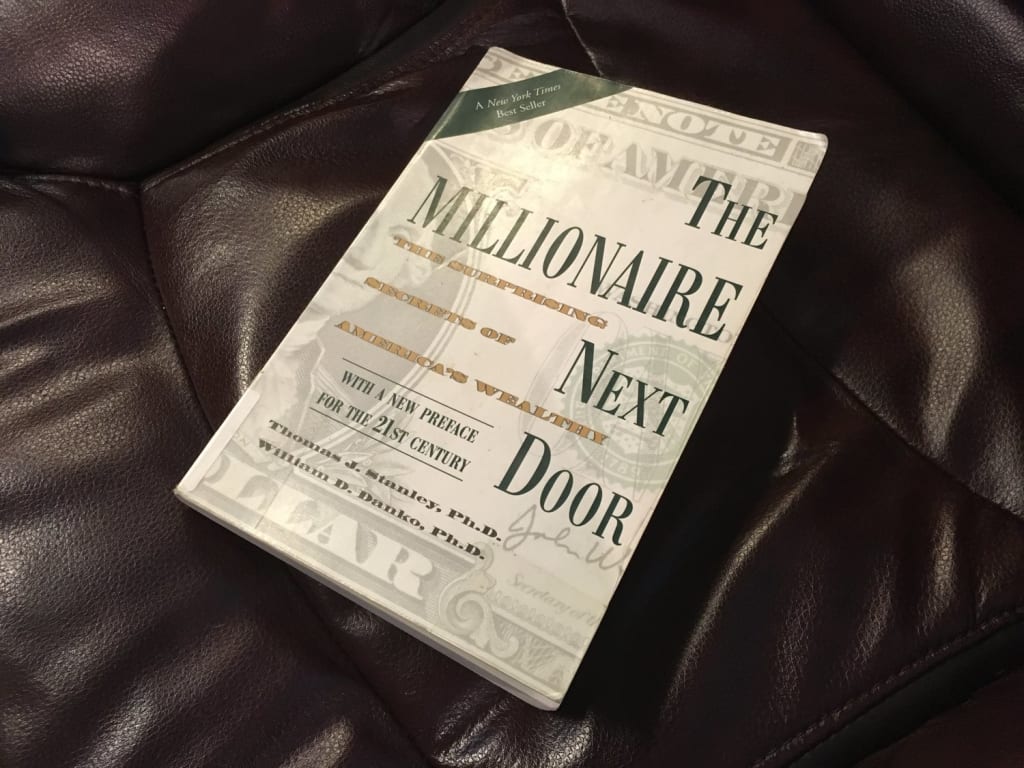The Millionaire Next Door by Thomas J. Stanley and William D. Danko
Thomas J. Stanley and William D. Danko

Introduction
"The Millionaire Next Door" by Thomas J. Stanley and William D. Danko is a groundbreaking book that challenges common perceptions of wealth and offers insights into the habits and characteristics of America's wealthy individuals. Published in 1996, this influential work presents a comprehensive study of millionaires and highlights the principles and behaviors that have contributed to their financial success. In this article, we will explore the key concepts and teachings presented in "The Millionaire Next Door."
Table of Contents
The Myth of Wealth: Challenging Stereotypes
The Accumulation of Wealth: Frugality and Saving
Income and Wealth: Understanding the Difference
The Role of Education and Career Choices
Financial Independence: Living Below Your Means
The Power of Self-Employment and Entrepreneurship
Wealth Building: Investing and Compound Interest
Financial Planning and Wealth Preservation
The Importance of Networking and Relationships
Prioritizing Family and Values
Building Wealth in Any Income Bracket
Breaking Free from Consumerism and Social Pressure
Teaching Financial Responsibility to the Next Generation
The Fallacy of High Social Status and Material Possessions
Achieving True Wealth and Financial Freedom
1. The Myth of Wealth: Challenging Stereotypes
"The Millionaire Next Door" challenges the common stereotypes associated with wealth. The book reveals that many millionaires do not fit the lavish and extravagant image portrayed in the media. Instead, they are often frugal, modest, and focused on long-term financial security.
2. The Accumulation of Wealth: Frugality and Saving
One of the key principles highlighted in the book is the importance of frugality and saving. Millionaires are often diligent savers who prioritize financial independence over instant gratification. They understand the value of living below their means and investing the difference.
3. Income and Wealth: Understanding the Difference
Stanley and Danko emphasize that high income does not necessarily equate to wealth. Many individuals with high salaries spend most of their earnings, leaving little room for wealth accumulation. The book emphasizes the importance of converting income into assets and net worth.
4. The Role of Education and Career Choices
Education and career choices play a significant role in wealth accumulation. "The Millionaire Next Door" reveals that many millionaires are self-employed or business owners who have chosen lucrative industries. The book emphasizes the value of pursuing skills and knowledge that have high earning potential.
5. Financial Independence: Living Below Your Means
Financial independence is a core principle discussed in the book. Millionaires prioritize saving and living below their means to achieve long-term financial security. They understand that the key to wealth accumulation is not excessive spending but smart money management.
6. The Power of Self-Employment and Entrepreneurship
Stanley and Danko highlight the power of self-employment and entrepreneurship in building wealth. Many millionaires have started their own businesses, allowing them to have control over their financial destinies and take advantage of income opportunities.
7. Wealth Building: Investing and Compound Interest
"The Millionaire Next Door" stresses the importance of investing and harnessing the power of compound interest. Millionaires understand that investing in appreciating assets, such as stocks and real estate, is crucial for long-term wealth accumulation.
8. Financial Planning and Wealth Preservation
The book emphasizes the significance of financial planning and wealth preservation. Millionaires actively manage their finances, seek professional advice, and make informed decisions to protect and grow their wealth over time.
9. The Importance of Networking and Relationships
Stanley and Danko emphasize the role of networking and cultivating strong relationships in wealth building. Millionaires understand the value of connecting with like-minded individuals, mentors, and business partners who can provide support, advice, and opportunities.
10. Prioritizing Family and Values
"The Millionaire Next Door" highlights the importance of family and values in the pursuit of wealth. Many millionaires prioritize the well-being and education of their children and strive to pass on financial knowledge and values to future generations.
11. Building Wealth in Any Income Bracket
The book dispels the notion that building wealth is only attainable for high-income individuals. It reveals that individuals from various income brackets can accumulate wealth by adopting prudent financial habits, living below their means, and making wise investment choices.
12. Breaking Free from Consumerism and Social Pressure
Stanley and Danko address the negative influence of consumerism and social pressure on wealth accumulation. Millionaires often resist the temptation to keep up with materialistic trends and focus on long-term financial goals instead.
13. Teaching Financial Responsibility to the Next Generation
"The Millionaire Next Door" emphasizes the importance of teaching financial responsibility to the next generation. Millionaires understand the value of financial education and pass on their knowledge and values to their children, equipping them with the tools for financial success.
14. The Fallacy of High Social Status and Material Possessions
The book challenges the fallacy that high social status and material possessions equate to wealth. Millionaires often prioritize financial security over the appearance of wealth, focusing on building assets and achieving true financial independence.
15. Achieving True Wealth and Financial Freedom
Ultimately, "The Millionaire Next Door" redefines wealth as financial independence and freedom. It emphasizes that true wealth is achieved by living within one's means, accumulating assets, and having the ability to live life on one's own terms.
Conclusion
"The Millionaire Next Door" offers a paradigm shift in understanding wealth and provides practical insights into the habits and behaviors of millionaires. The book emphasizes the importance of frugality, saving, investing, and living below one's means to achieve long-term financial security and independence. By adopting the principles outlined in this book, individuals can cultivate a wealth-building mindset and increase their chances of achieving true financial freedom.
Frequently Asked Questions
Are the principles discussed in "The Millionaire Next Door" applicable outside the United States?
Yes, while the book primarily focuses on American millionaires, many of the principles and concepts presented in "The Millionaire Next Door" are applicable worldwide. The mindset of frugality, saving, and investing is universally beneficial for wealth accumulation.
Can anyone become a millionaire by following the principles in the book?
While there are no guarantees, adopting the principles presented in "The Millionaire Next Door" can significantly increase the likelihood of accumulating wealth over time. Individual circumstances and factors such as income, expenses, and investment choices will also impact wealth accumulation.
Is it necessary to be self-employed to become a millionaire?
No, self-employment is not a requirement for wealth accumulation. "The Millionaire Next Door" highlights that individuals can build wealth through various means, including traditional employment, as long as they adopt prudent financial habits and make wise investment choices.
Can the principles in "The Millionaire Next Door" be applied to any income level?
Absolutely! "The Millionaire Next Door" emphasizes that building wealth is not solely dependent on income level. The principles of frugality, saving, and investing can be applied by individuals at any income level to achieve long-term financial security.
Where can I find a copy of "The Millionaire Next Door" by Thomas J. Stanley and William D. Danko?
"The Millionaire Next Door" is widely available in bookstores, libraries, and online platforms as both physical copies and e-books. It is a valuable resource for anyone seeking to understand the mindset and behaviors of self-made millionaires.
About the Creator
Karim Mossa
mmmm






Comments
There are no comments for this story
Be the first to respond and start the conversation.